
The Rivkin Project:
How Globalism Uses Multiculturalism to Subvert Sovereign Nations, Part 1
Kerry BOLTON
Ex: http://counter-currents.com/
During October 19–22, 2010, Charles Rivkin, US Ambassador to France, invited a 29-member delegation from the Pacific Council on International Policy (PCIP) to a conference in France, the main purpose of which was to discuss Arab and Islamic relations in the country.[1] The meeting was part of a far-reaching subversive agenda to transform that entire character of France and in particular the consciousness of French youth, which includes the use of France’s Muslim youth in a typically manipulative globalist strategy behind the usual façade of “human rights” and “equality.”
Globalist Delegation at US Embassy
The PCIP report states of the conference:
. . . The delegation further focused on three key themes. First, the group examined Franco-Muslim issues in France through exchanges with Dr. Bassma Kodmani, Director of the Arab Reform Institute, and Ms. Rachida Dati, the first female French cabinet member of North African origin and current Mayor of the 7th Arrondissement in Paris. A trip to the Grand Mosque of Paris and a meeting with the Director of Theology and the Rector there provided additional insight. Second, meetings with Mr. Jean-Noel Poirier, the Vice President of External Affairs at AREVA (a highly innovative French energy company), and with Mr. Brice Lalonde, climate negotiator and former Minister of the Environment, highlighted energy and nuclear policy issues and the differences between U.S. and French policies in these arenas. And finally, the delegation explored the connections between media and culture in California (Hollywood) and France in meetings at the Louvre, the Musee D’Orsay, and at FRANCE 24 — the Paris-based international news and current affairs channel.[2]
The over-riding concern seems to have been on matters of a multicultural dimension, including not only Arab and Islamic relations in France, but perhaps more importantly in the long term, a discussion on the impact of Hollywood “culture” on the French.
The USA has long played a duplicitous game of “fighting terrorism” of an “Islamic” nature as one of the primary elements of its post-Cold War stratagem of manufactured permanent crises, while using “radical Islam” for it own purposes, the well-known examples being: (1) Supporting Bin Ladin in the war against Russia in Afghanistan, (2) backing Saddam Hussein in the war against Iran, (3) supporting the Kosovo Liberation Army in ousting Serbian sovereignty over mineral rich Kosovo, the KLA having been miraculously transformed from being listed by the US State Department as a “terrorist organization,” to becoming “freedom fighters.”
When US globalists pose as friends of Muslims, the latter should sup with the Great Shaitan with an exceedingly long spoon.
What is the Pacific Council on International Policy?
The PCIP of which Rivkin is a member was founded in 1995 as a regional appendage of the omnipresent globalist think tank, the Council on Foreign Reactions (CFR),[3] is headquartered in Los Angeles, but “with members and activities throughout the West Coast of the United States and internationally.” Corporate funding comes from, among others:
Carnegie Corporation of New York
Chicago Council on Foreign Relations
City National Bank
The Ford Foundation
Bill and Melinda Gates Foundation
The William & Flora Hewlett Foundation
Rockefeller Brothers Fund
The Rockefeller Foundation
United States Institute of Peace[4]
The PCIP is therefore yet another big player in the globalist network comprising hundreds of usually interconnected organizations, lobbies, “civil society” groups, NGOs, and think tanks, associated with banks and other corporations. As usual, there is a conspicuous presence by Rockefeller interests.
Why France?
France has long been a thorn in the side of US globalism because of its stubborn adherence to French interests around the world, rather than those of the manufactured “world community,” although the Sarkozy regime is an exception. However, France is one of the few states left in Western Europe with a strong national consciousness. The best way of destroying any such feeling — which translates too often into policy — is to weaken the concepts of nationhood and nationality by means of promoting “multiculturalism.”
Was it only coincidence that the 1968 student revolt, sparked by the most puerile of reasons, occurred at a time both when the CIA was very active in funding student groups around the world, and when President De Gaulle was giving the USA maximum trouble in terms of foreign policy? De Gaulle did little to play along with American’s post-war plans. He withdrew France form NATO command, during in World War II was distrusted by the USA.[5]
Of particular concern would have been De Gaulle’s advocacy of a united Europe to counteract US hegemony.[6] In 1959 he stated at Strasbourg: “Yes, it is Europe, from the Atlantic to the Urals, it is the whole of Europe, that will decide the destiny of the world.” The expression implied co-operation between a future Europe and the USSR. In 1967 he declared an arms embargo on Israel and cultivated the Arab world. This is the type of legacy that globalists fear.
With the buffoonery of Sarkozy, and mounting tension with disaffected Muslim youth, a backlash could see an intransigently anti-globalist, “xenophobic” regime come to power. In today’s context, what better way now to subvert French nationalism and any potential to revive as an anti-globalist force, than to use its large, unassimilated Islamic component, just as the Bolshevik revolution was undertaken to a significant extent by the disaffected minorities of the Russian Empire?
Of interest also is the concern this delegation had for the influence of Hollywood on French culture. This might seem at first glance to be an odd concern. However, Hollywood, as the economic symbol of globalist cultural excrescence, is an important factor in globalization, in what amounts to a world culture-war. Ultimately the goal of globalism is not to promote the survival of ethnic cultures and identities, but rather to submerge them into one big melting pot of global consumerism, to uproot every individual from an identity and heritage and replace that with the global shopping mall, and the “global village.” Therefore multiculturalism should be viewed as the antithesis of what it is understood as being.
So far from the global corporates wanting to promote so-called multiculturalism in terms of assuring the existence of a multiplicity of cultures, as the term implies; it is to the contrary part of a dialectical process whereby a under the facade of ideals, peoples of vastly different heritage are moved across the world like pawns on a chess board, the aim being to break down culturally specific nations. It is an example of Orwellian “doublethink.”[7]
It is notable that the instigators of the “velvet revolutions” now sweeping North Africa and reaching into Iran are largely “secularized” youths without strong traditionalist roots. Similarly, the best way to solve France’s ethnic conflicts and to assure that France does not re-emerge again to confront US/globalist interests, is to dialectically create a new cultural synthesis where there is neither a French culture nor an Islamic culture, but under the banner of “human rights” and “equality,” a globalist youth-based culture nurtured by Hollywood, MTV, cyberspace, MacDonald’s and Pepsi.
That this is more than hypothesis is indicated by the manner by which the secular youth revolts now taking place in North Africa have been spawned by an alliance of corporate interests, sponsored by the US State department and sundry NGOs such as Freedom House.[8] The North African “revolutionaries” toppling regimes are just the type of “Muslim” that the globalists prefer; imbued with the cyber-consumer mentality.
So what are Rivkin and the US State Department up to in France, that they should be so interested in the place of Hollywood and of Muslims in the country?
Notes
1. “2010 France Country Dialogue,” PCIP, http://www.pacificcouncil.org/page.aspx?pid=583
2. “2010 France Country Dialogue,” ibid.
3. “Founded in 1995 in partnership with the Council on Foreign Relations,” PCIP, Governance, http://www.pacificcouncil.org/page.aspx?pid=373
4. Corporate and Foundation funding: http://www.pacificcouncil.org/page.aspx?pid=513
5. S. Berthon, Allies At War (London: Collins, 2001), p. 21.
6. A. Crawley, De Gaulle (London: The Literary Guild, 1969), p. 439.
7. “The power of holding two contradictory beliefs in one’s mind simultaneously, and accepting both of them . . .” George Orwell, Nineteen Eighty-Four (London: Martin Secker and Warburg, 1949), Part 1, Ch. 3, p. 32.
8. K. R. Bolton, “Twitters of the World Unite! The Digital New-New Left as Controlled Opposition,” Part 1, Part 2, Part 3, and Part 4. Tony Cartalucci, “Google’s Revolution Factory – Alliance of Youth Movements: Color Revolution 2.0,” Global Research, February 23, 2011, http://www.globalresearch.ca/index.php?context=va&aid=23283
The Rivkin Project:
How Globalism Uses Multiculturalism to Subvert Sovereign Nations, Part 2
The Rivkin Project for Subverting French Youth
In 2010 when US ambassador Charles Rivkin invited a delegation of fellow Pacific Council on International Policy members to France, he had outlined a program for the Americanization of France that primarily involved the use of the Muslim minorities and the indoctrination of French youth with corporate globalist ideals. The slogan invoked was the common commitment of France and America historically to “equality.”
Wikileaks released the “confidential” program. It is entitled “Minority Engagement Strategy.”[1] Here Rivkin outlines a program that is a flagrant interference in the domestic affairs of a sovereign nation and, more profoundly, seeks to change the attitudes of generations of Muslim and French youth so that they merge into a new globalist synthesis; or what might be called a new humanity: Homo economicus, or what the financial analyst G. Pascal Zachary calls “The Global Me,”[2] to achieve what Rivkin describes as the USA’s “national interest.”
Rivkin begins by stating that his embassy has created a “Minority Engagement Strategy” that is directed primarily at Muslims in France. Rivikin states as part of the program: “We will also integrate the efforts of various Embassy sections, target influential leaders among our primary audiences, and evaluate both tangible and intangible indicators of the success of our strategy.”[3]
Rivkin is confident that France’s history of ideological liberalism “will serve us well as we implement the strategy outlined here . . . in which we press France . . .” Note the phrase: “press France.” America’s global agenda is linked by Rivkin to his blueprint for transforming France into “a thriving, inclusive French polity [which] will help advance our interests in expanding democracy and increasing stability worldwide.” The program will focus on the “elites” of the French and the Muslim communities, but will also involve a massive propaganda campaign directed at the “general population,” with a focus on youth.
At high levels US officials will place French officials on the defensive. The program also includes redefining French history in the school curricula to give attention to the role of non-French minorities in French history. It means that the Pepsi/MTV generation of Americans will be formulating new definitions of French culture and writing new pages of French history to accord with globalist agendas. Towards this end: “. . . we will continue and intensify our work with French museums and educators to reform the history curriculum taught in French schools.”
“Tactic Number Three” is entitled: “Launch Aggressive Youth Outreach.” As in other states targeted by the US State Department and their allies at the Soros network, Freedom House, Movement.org, National Endowment for Democracy, Solidarity Center,[4] and so forth; disaffected youth are the focus for change. Leading the charge on this effort, the Ambassador’s inter-agency Youth Outreach Initiative aims to “engender a positive dynamic among French youth that leads to greater support for US objectives and values.” Can the intentions be stated any plainer? It is Americanization culturally and politically.
It is here that we can most easily get past the cant and clearly see what is behind the strategy: to form a generation “that leads to greater support for US objectives and values.” These “US objectives and values” will be sold to the French as French values on the basis of the bourgeois ideals of 1789 which continue to encumber French ideology on both Left and Right. They will be taught to think that they are upholding French traditions, rather than acting as agents of change according to “American values”: the values of the global village and the global shopping mall. A far-reaching program incorporating a variety of indoctrination methods is outlined:
To achieve these aims, we will build on the expansive Public Diplomacy programs already in place at post, and develop creative, additional means to influence the youth of France, employing new media, corporate partnerships, nationwide competitions, targeted outreach events, especially invited US guests.[5]
The program directed at youth in France is similar to that directed at the youth that formed the vanguard of the “velvet revolutions” from Eastern Europe to North Africa. Potential leaders are going to be taken up by the US State Department in France and cultivated to play a part in the future France of American design:
We will also develop new tools to identify, learn from, and influence future French leaders.
As we expand training and exchange opportunities for the youth of France, we will continue to make absolutely certain that the exchanges we support are inclusive.
We will build on existing youth networks in France, and create new ones in cyberspace, connecting France’s future leaders to each other in a forum whose values we help to shape — values of inclusion, mutual respect, and open dialogue.[6]
Here Rivkin is advocated something beyond influencing Muslims in France. He is stating that a significant part of the program will be directed towards cultivating French youth, the potential leaders, in American ideals, under the façade of French ideals. The US State Department and their corporate allies and allied NGOs intend to “shape their values.” The globalist program for France is stated clearly enough to be the re-education of French youth. One would think that this is the most important role of the French Government, the Catholic Church and the family; the latter two in particular. American bureaucrats and their inane sidekicks recruited from professions are to formulate new “French values.”
As in the states that are chosen for “velvet revolutions” part of the strategy includes demarcating the political confines. As Hillary Clinton recently stated in regard to the type of state the US Establishment expects to emerge after Qadaffi, the new Libya should be an inclusive democracy, open to all opinions, as long as those opinions include a commitment to “equality” and “democracy”; in other words, there must be a new dispensation of freedom in Libya, so long as that freedom does not extend beyond America’s definition of it. And if someone oversteps the lines of acceptable democracy, American bombers are on standby. In the context of France, however, it is clear that the demarcation of French politics according to globalist dictates cannot include any elements of so-ccalled “xenophobia” (sic), which in today’s context would include a return to the grand politics of the De Gaulle era. Hence, “Tactic 5” states:
Fifth, we will continue our project of sharing best practices with young leaders in all fields, including young political leaders of all moderate parties so that they have the toolkits and mentoring to move ahead. We will create or support training and exchange programs that teach the enduring value of broad inclusion to schools, civil society groups, bloggers, political advisors, and local politicians.[7]
Rivkin is outlining a program to train France’s future political and civic leaders. While the programs of US Government-backed NGOs, such as the National Endowment for Democracy — ostensibly designed to develop entire programs and strategies for political parties in “emerging democracies,” such as the states of the ex-Soviet bloc — can be rationalized by way of a lack of a heritage of liberal-democratic party politics, the same rationale can hardly be used to justify America’s interference in France’s party politics.
Towards this end Rivkin states that the 1,000 American English language teachers employed at French schools will be provided with the propaganda materials necessary to inculcate the desired ideals into their French pupils: “We will also provide tools for teaching tolerance to the network of over 1,000 American university students who teach English in French schools every year.”
The wide-ranging program will be co-ordinated by the “Minority Working Group” in “tandem” with the “Youth Outreach Initiative.” One of the problems monitored by the Group will be the “decrease in popular support for xenophobic political parties and platforms.” This is to ensure that the program is working as it should to block the success of any “extreme” or “xenophobic” party that might challenge globalization.
Rivkin clarifies the subversive nature of the program when stating: “While we could never claim credit for these positive developments, we will focus our efforts in carrying out activities, described above, that prod, urge, and stimulate movement in the right direction.”
What would the reaction be if the French Government through its Embassy in Washington undertook a program to radically change the USA in accordance with “French national interests,” inculcating through an “aggressive outreach program” focusing on youth, “French ideals” under the guise of “American ideals on human rights.” What would be the response of the US Administration if it was found that the French Government were trying to influence the attitudes also of Afro-Americans, American-Indians, and Latinos? What would be the official US reaction if it was found that French language educators in American schools and colleges were trying to inculcate American pupils with ideas in the service of French interests?
The hypothetical reaction can be deduced from the US response to the “Soviet conspiracy” when Senate and Congressional committees were set up to investigate anyone even vaguely associated with the USSR. So what’s different? The USA perpetrates a subversive strategy in the interests of it globalist cooperate elite, instead of in the interests of the USSR or communism. It is not as though the USA has had much of a cultural heritage that it can present itself to any European nation, let alone France, as the paragon of good taste and artistic refinement upon which a national identity can be constructed. It this matter, it is a case of deconstruction.
Notes
1. C. Rivkin, “Minority Engagement Report,” US Embassy, Paris, http://www.wikileaks.fi/cable/2010/01/10PARIS58.html
2. G. Pascal Zachary, The Global Me: Why Nations will succeed or Fail in the Next Generation (New South Wales, Australia: Allen and Unwin, 2000).
3. Rivkin.
4. K. R. Bolton, “The Globalist Web of Subversion,” Foreign Policy Journal, February 7, 2011, http://www.foreignpolicyjournal.com/2011/02/07/the-globalist-web-of-subversion/
5. Rivkin.
6. Rivkin.
7. Rivkin.
The Rivkin Project:
How Globalism Uses Multiculturalism to Subvert Sovereign Nations, Part 3
Many nefarious aims have been imposed under the banner of multiculturalism and slogans such as “equality” and “human rights.” As “democracy” has been used to justify the bombing states throughout recent history, these slogans often serve as rhetoric to beguile the well-intentioned while hiding the aims of those motivated by little if anything other than power and greed.
One might think of the manner by which the issue of the Uitlanders was agitated to justify the Anglo-Boer wars for the purpose of procuring the mineral wealth of South Africa for the benefit of Cecil Rhodes, Alfred Beit, et al.
A similar issue was revived in our own time, under the name of “fighting apartheid,” and while the world was jubilant at the assumption to power of the ANC, the reality has been that the Africans have not benefited materially one iota, but the parastatals or state owned enterprises are being privatized so that they can be sold off to global capitalism. When the patriarch of South African capitalism, Harry Oppenheimer, whose family was a traditional foe of the Afrikaners, died in 2000,Nelson Mandela eulogized him thus: “His contribution to building partnership between big business and the new democratic government in that first period of democratic rule can never be appreciated too much.”[1]
The “democracy” Oppenheimer and other plutocrats in tandem with the ANC created in South Africa is the freedom for global capital to exploit the country. Mandela stated the result of this “long march to freedom” in 1996: “Privatization is the fundamental policy of the ANC and will remain so.”[2] In commenting on the privatization of the Johannesburg municipal water supply, which is now under the French corporation Suez Lyonnaise Eaux, the ANC issued a statements declaring that: “Eskom is one of a host of government owned ‘parastatals’ created during the apartheid era which the democratically elected government has set out to privatise in a bid to raise money.”[3] It is the same outcome for South Africa that was achieved by the “liberation” of Kosovan minerals in the name of “democracy” and in the name of the rights of Muslims under Serb rule, while other Muslims under their own rule are bombed into submission by the USA and its allies.
The Aims of Global Capitalism
The nature of the globalist dialectic has been explained particularly cogently by Noam Chomsky:
See, capitalism is not fundamentally racist — it can exploit racism for its purposes, but racism isn’t built into it. Capitalism basically wants people to be interchangeable cogs, and differences among them, such as on the basis of race, usually are not functional. I mean, they may be functional for a period, like if you want a super exploited workforce or something, but those situations are kind of anomalous. Over the long term, you can expect capitalism to be anti-racist — just because it’s anti-human. And race is in fact a human characteristic — there’s no reason why it should be a negative characteristic, but it is a human characteristic. So therefore identifications based on race interfere with the basic ideal that people should be available just as consumers and producers, interchangeable cogs who will purchase all the junk that’s produced — that’s their ultimate function, and any other properties they might have are kind of irrelevant, and usually a nuisance.[4]
The Chomsky statement cogently expresses the situation in its entirety.
France as a Social Laboratory for Globalization
The Rivkin offensive is the latest in a long line of programs for undermining French identity. France is a paradox, combining the cosmopolitan values of the bourgeois Revolution of 1789 with a stubborn traditionalism and nationalism, which the globalists term “xenophobia.” It is manifested even in small ways such as the legal obligation of French public servants and politicians to speak only French to the foreign media, regardless of their knowledge of any other language; or the widespread resistance in France to McDonalds and Disney World.
France, like much of the rest of the world, however, is fighting a losing cultural battle against globalization. Jeff Steiner’s column “Americans in France,” refers to the manner by which the French at one time resisted the opening of the American fast food franchise as “part of an American cultural invasion.” Steiner writes:
. . . That seems to be past as McDonalds has so become a part of French culture that it’s not seen as an American import any longer, but wholly French. In short, McDonalds has grown on the French just like in so many other countries.
I’ve been to a few McDonalds in France and, except for one in Strasbourg that looks from the outside to be built in the traditional Alsatian style, all McDonalds in France that I have seen look no different than their American counterparts.
Yes, there are those that still curse McDo (They are now a very small group and mostly ignored) as the symbol of the Americanization of France and who also see it as France losing its uniqueness in terms of cuisine. The menu in a French McDonalds is almost an exact copy of what you would find in any McDonalds in the United States. It struck me as a bit odd that I could order as I would in the United States, that is in English, with the odd French preposition thrown in.
If truth were told, the French who eat at McDonalds are just as much at home there as any American could be.[5]
This seemingly trivial example is actually of immense importance in showing just how a culture as strong as that of France — until recently an immensely proud nation — can succumb, especially under the impress of marketing towards youngsters. It is a case study par excellence of the standardization that American corporate culture entails. It is what the globalist elite desires on a world scale, right down to what one eats.
It is notable that the vanguard of resistance to McDonalds came from farmers, a traditionalist segment of Europe’s population that is becoming increasingly anomalous and under the globalist regime will become an extinct species as agriculture gives way to agribusiness.
Given France’s status in Europe and its historical tendency to maintain its sovereignty in the face of US interests — even quite recently with its opposition to the war against Iraq — France remains one globalism’s few stumbling blocks in Europe. An added concern is that the French will take their stubborn “xenophobia” to the polls and elect a stridently anti-globalist party, as reflected in the electoral ups and downs of the Front National, which opposes both globalization and privatization.
This is a major reason for Rivkin’s far-reaching subversive and interventionist program to assimilate Muslims into French society, which would fundamentally transform French consciousness to be more thoroughly cosmopolitan. The intention is clear enough in the Rivkin embassy documents where it is stated that the Embassy will monitor the effects of the “outreach” program on the “decrease in popular support for xenophobic political parties and platforms.”
Contra the “xenophobia” of France, R. J. Barnet and R. E. Müller’s study of the global corporation, Global Reach,[6] based on interviews with corporate executives, shows that the French business elite has long been seeking to undermine the foundations of French tradition. Jacques Maisonrouge, president of the IBM World Trade Corporation “likes to point out that ‘Down with borders,’ a revolutionary student slogan of the 1968 Paris university uprising – in which some of his children were involved – is also a welcome slogan at IBM.”[7] Maisonrouge stated that the “World Managers” (as Barnett and Muller call the corporate executives) believe they are making the world “smaller and more homogeneous.”[8] Maisonrouge approvingly described the global corporate executive as “the detribalized, international career men.”[9] It is this “detribalization” that is the basis of a “world consumer culture” required to more efficiently create a world economy.
Paris is already a cosmopolitan center and therefore ideal as a prototype for the “global city” of the future. In the 1970s Howard Perlmutter and Hasan Ozekhan of the Wharton School of Finance Worldwide Institutions Program prepared a plan for a “global city.” Paris was chosen for the purpose. Prof. Perlmutter was a consultant to global corporations. His plan was commissioned by the French Government planning agency. Perlmutter predicted that cities would become “global cities” during the 1980s.
For Paris, this required “becoming less French” and undergoing “denationalization.” This, he said, requires a “psycho-cultural change of image with respect to the traditional impression of ‘xenophobia’ that the French seem to exude.” The parallels with the current Rivkin program are apparent. Perlmutter suggested that the best way of ridding France of its nationalism was to introduce multiculturalism. He advocated “the globalization of cultural events” such as international rock festivals, as an antidote to “overly national and sometimes nationalistic culture.”[10]
Undermining France’s “overly national and sometimes nationalistic culture” is the reason Rivkin sought to foster stronger connections between Hollywood and the French culture industry.[11] Rivkin knows the value of entertainment in transforming attitudes, especially among the young. After working as a corporate finance analyst at Salomon Brothers, Rivkin joined The Jim Henson Company in 1988 as director of strategic planning. Two years later, he was made vice president of the company.
The Jim Henson Company produces Sesame Street, whose cute little muppets push a well-calculated globalist agenda to toddlers. Lawrence Balter, professor of applied psychology at New York University, wrote that Sesame Street “introduced children to a broad range of ideas, information, and experiences about diverse topics such as death, cultural pride, race relations, people with disabilities, marriage, pregnancy, and even space exploration.” The series was the first to employ educational researchers, with the formation of a Research Department.[12] Sesame Street has received funding from the Ford Foundation, the Carnegie Corporation, and the US Office of Education. Of passing interest is that the Carnegie Corporation and the Ford Foundation are also patrons of the Pacific Council on International Policy.
Creating the World Consumer
As Chomsky has pointed out, global capitalism sees humanity in terms of interchangeable cogs in the production and consumption cycle. The summit of corporate human evolution is transformation into “detribalized, international career men.” According to financial journalist G. Pascal Zachary, these rootless cosmopolitans constitute an “informal global aristocracy” recruited all over the world by corporations, depending totally on their companies and “little upon the larger public,” a new class unhindered by national, cultural, or ethnic bonds.[13]
Barnett and Muller quoted Pfizer’s John J. Powers as stating that global corporations are “agents for change, socially, economically and culturally.”[14] They stated that global executives see “irrational nationalism” as inhibiting “the free flow of finance capital, technology, and goods on a global scale.” A crucial aspect of nationalism is “differences in psychological and cultural attitudes, that complicate the task of homogenizing the earth into an integrated unit. . . . Cultural nationalism is also a serious problem because it threatens the concept of the Global Shopping Center.”[15]
This “cultural nationalism” is described by Rivkin and all other partisans of globalism as “xenophobia,” unless that “xenophobia” can be marshaled in the service of a military adventure when bribes, embargoes and threats don’t bring a reticent state into line, as in the cases of Serbia, Iraq, and perhaps soon, Libya. Then the American globalist elite and their allies become “patriots.”
Barnet and Muller cite A. W. Clausen when he headed the Bank of America, as stating that national, cultural, and racial differences create “marketing problems,” lamenting that there is “no such thing as a uniform, global market.”[16] Harry Heltzer, Chief Executive Officer of 3M stated that global corporations are a “powerful voice for world peace because their allegiance is not to any nation, tongue, race, or creed but to one of the finer aspirations of mankind, that the people of the world may be united in common economic purpose.”[17]
These “finer aspirations of mankind,” known in other quarters as greed, avarice, and Mammon-worship, have despoiled the earth, caused global economic imbalance, and operate on usury that was in better times regarded as a sin. These “finer aspirations,” by corporate reckoning, have caused more wars than any “xenophobic” dictator, usually in the name of “world peace,” and “democracy.”
The Rivkin doctrine for France — which according to the leaked document, must be carried out in a subtle manner — is a far-reaching subversive program to transform especially the young into global clones devoid of cultural identity, while proceeding, in the manner of Orwellian “doublethink,” under the name of “multiculturalism.”
Notes
1. “Mandela honours ‘monumental’ Oppenheimer”, The Star, South Africa, August 21, 2000, http://www.iol.co.za/index.php?set_id=1&click_id=13&art_id=ct20000821001004683O150279 (accessed September 27, 2009).
2. Lynda Loxton, “Mandela: We are going to privatise,” The Saturday Star, May 25, 1996, p.1.
3. ANC daily news briefing, June 27, 2001. See also “Eskom,” ANC Daily News Briefing, June 20, 2001, 70.84.171.10/~etools/newsbrief/2001/news0621.txt
4. Noam Chomsky, Understanding Power: The Indispensable Chomsky (New York: The New York Press, 2002), pp. 88–89.
5. J. Steiner, “American in France: Culture: McDonalds in France, http://www.americansinfrance.net/culture/mcdonalds_in_france.cfm
6. R. J. Barnet and R. E. Müller, Global Reach: The Power of the Multinational Corporations (New York: Simon and Schuster, 1974).
7. Global Reach, p. 19. For an update on Maisonrouge see: IBM, http://www-03.ibm.com/ibm/history/exhibits/builders/builders_maisonrouge.html
8. Global Reach, , p. 62.
9. Global Reach, ibid.
10. Global Reach, pp. 113–14.
11. “2010 France Country Dialogue,” PCIP, op. cit.
12. L. Balter, Parenthood in America: An Encyclopaedia, Vol. 1 (ABC-CLIO, 2000), p. 556.
13. G. Pascal Zachary, The Global Me (New South Wales: Allen & Unwin, 2000).
14. Global Reach, p. 31.
15. Global Reach, p. 58.
16. Global Reach, ibid.
17. Global Reach, p. 106.





 del.icio.us
del.icio.us
 Digg
Digg


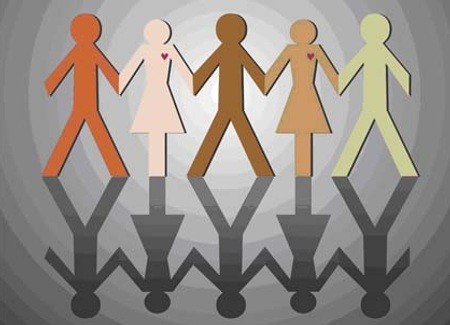
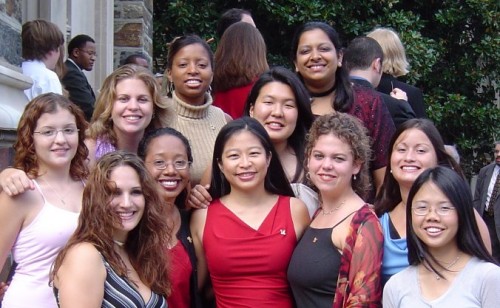

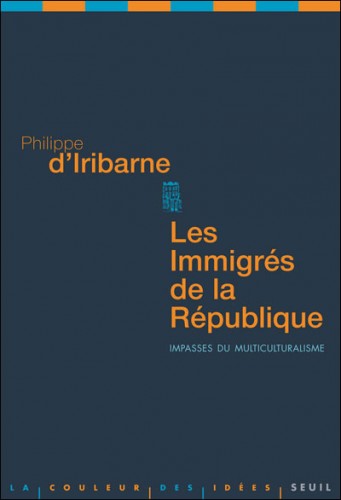 Nous sommes dans une situation paradoxale qu’on a retrouvée lors des débats sur l’identité française ou de l’expulsion des Roms. Il y a une tension entre le citoyen et l’individu.
Nous sommes dans une situation paradoxale qu’on a retrouvée lors des débats sur l’identité française ou de l’expulsion des Roms. Il y a une tension entre le citoyen et l’individu.


 Ellen KOSITZA
Ellen KOSITZA
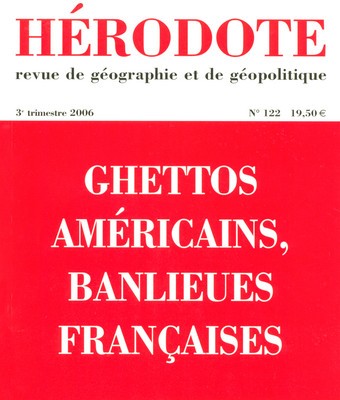 L’Etat ne jouant plus son rôle de créateur de lien social et l’école ne remplissant plus son rôle d’assimilation, ces populations récemment arrivées sur notre sol sont en proie à un vide identitaire découlant d’un rejet violent de la civilisation française (attitude que l’on retrouve également aujourd’hui chez beaucoup de « petites têtes blondes »).Elles compensent ce vide en endossant des identités alternatives, souvent inspirées ; pour les jeunes Noirs, des « gangs » américains et pour les jeunes Maghrébins, de la « mythification du bled » fièrement affichée et revendiquée, à en juger par le port de nombreux vêtements aux couleurs du Maroc ou de l’Algérie, dont le commerce tire par ailleurs profit. De plus, ce que l’on présente un peu hâtivement comme une « réislamisation » de ces populations ne trahit pas tant « un retour du religieux » que l’apparition d’un « Islam identitaire » destiné à palier cette crise identitaire. Si beaucoup pratiquent le Ramadhan, combien en revanche prient cinq fois par jour tout au long de l’année ? Combien ont lu le Coran en entier ? Combien ont fait ou feront leur voyage à la Mecque ? De plus, comment trouver sa place dans la société quand on ne possède qu’un bagage lexical d’une pauvreté inouïe, mêlant « verlan », français et mots nord-africains ou sub-sahariens ?
L’Etat ne jouant plus son rôle de créateur de lien social et l’école ne remplissant plus son rôle d’assimilation, ces populations récemment arrivées sur notre sol sont en proie à un vide identitaire découlant d’un rejet violent de la civilisation française (attitude que l’on retrouve également aujourd’hui chez beaucoup de « petites têtes blondes »).Elles compensent ce vide en endossant des identités alternatives, souvent inspirées ; pour les jeunes Noirs, des « gangs » américains et pour les jeunes Maghrébins, de la « mythification du bled » fièrement affichée et revendiquée, à en juger par le port de nombreux vêtements aux couleurs du Maroc ou de l’Algérie, dont le commerce tire par ailleurs profit. De plus, ce que l’on présente un peu hâtivement comme une « réislamisation » de ces populations ne trahit pas tant « un retour du religieux » que l’apparition d’un « Islam identitaire » destiné à palier cette crise identitaire. Si beaucoup pratiquent le Ramadhan, combien en revanche prient cinq fois par jour tout au long de l’année ? Combien ont lu le Coran en entier ? Combien ont fait ou feront leur voyage à la Mecque ? De plus, comment trouver sa place dans la société quand on ne possède qu’un bagage lexical d’une pauvreté inouïe, mêlant « verlan », français et mots nord-africains ou sub-sahariens ? Die meisten Muslime wohnen in der europäischen Hauptstadt in »multikulturellen« Brüsseler Stadtteilen wie Molenbeek, ballen sich dort in Ghettos zusammen, wollen mit den ethnischen Europäern nichts zu tun haben. Ihre Aggressivität und Integrationsverweigerung führt zur kulturellen Verarmung der europäischen Hauptstadt. Das beklagen inzwischen in Belgien auch bekannte Abgeordnete der Partei Die Grünen. »Die Ghettos von Brüssel« heißt ein langer Artikel, den der Grünen-Abgeordnete Luckas Vander Taelen jetzt in der renommierten Zeitung »De Standaard« über die schlimmen Zustände veröffentlicht hat. Er hat das Tabu gebrochen – und politisch nicht korrekt die Wahrheit aufgeschrieben.
Die meisten Muslime wohnen in der europäischen Hauptstadt in »multikulturellen« Brüsseler Stadtteilen wie Molenbeek, ballen sich dort in Ghettos zusammen, wollen mit den ethnischen Europäern nichts zu tun haben. Ihre Aggressivität und Integrationsverweigerung führt zur kulturellen Verarmung der europäischen Hauptstadt. Das beklagen inzwischen in Belgien auch bekannte Abgeordnete der Partei Die Grünen. »Die Ghettos von Brüssel« heißt ein langer Artikel, den der Grünen-Abgeordnete Luckas Vander Taelen jetzt in der renommierten Zeitung »De Standaard« über die schlimmen Zustände veröffentlicht hat. Er hat das Tabu gebrochen – und politisch nicht korrekt die Wahrheit aufgeschrieben.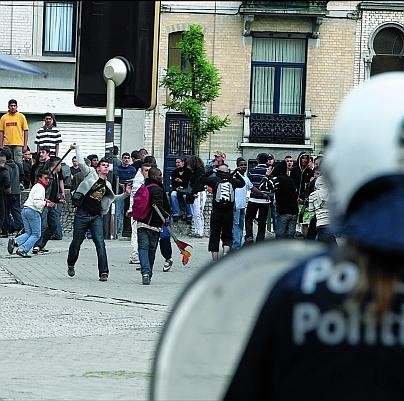 In den Niederlanden ist die Entwicklung bei den Grünen ähnlich – dort hat unlängst Femke Halsema, die immerhin die Vorsitzende der Grünen ist, den Islam öffentlich als großes Problem angeprangert. Von der angeblichen großen kulturellen »Bereicherung« durch den Islam will auch die niederländische Grünen-Vorsitzende nichts mehr wissen. (Quelle:
In den Niederlanden ist die Entwicklung bei den Grünen ähnlich – dort hat unlängst Femke Halsema, die immerhin die Vorsitzende der Grünen ist, den Islam öffentlich als großes Problem angeprangert. Von der angeblichen großen kulturellen »Bereicherung« durch den Islam will auch die niederländische Grünen-Vorsitzende nichts mehr wissen. (Quelle: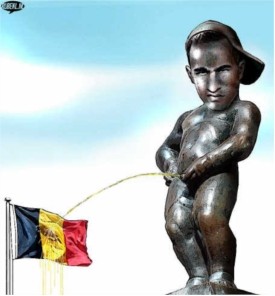




Ex: http://yvespernet.wordpress.com/